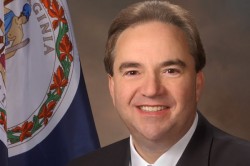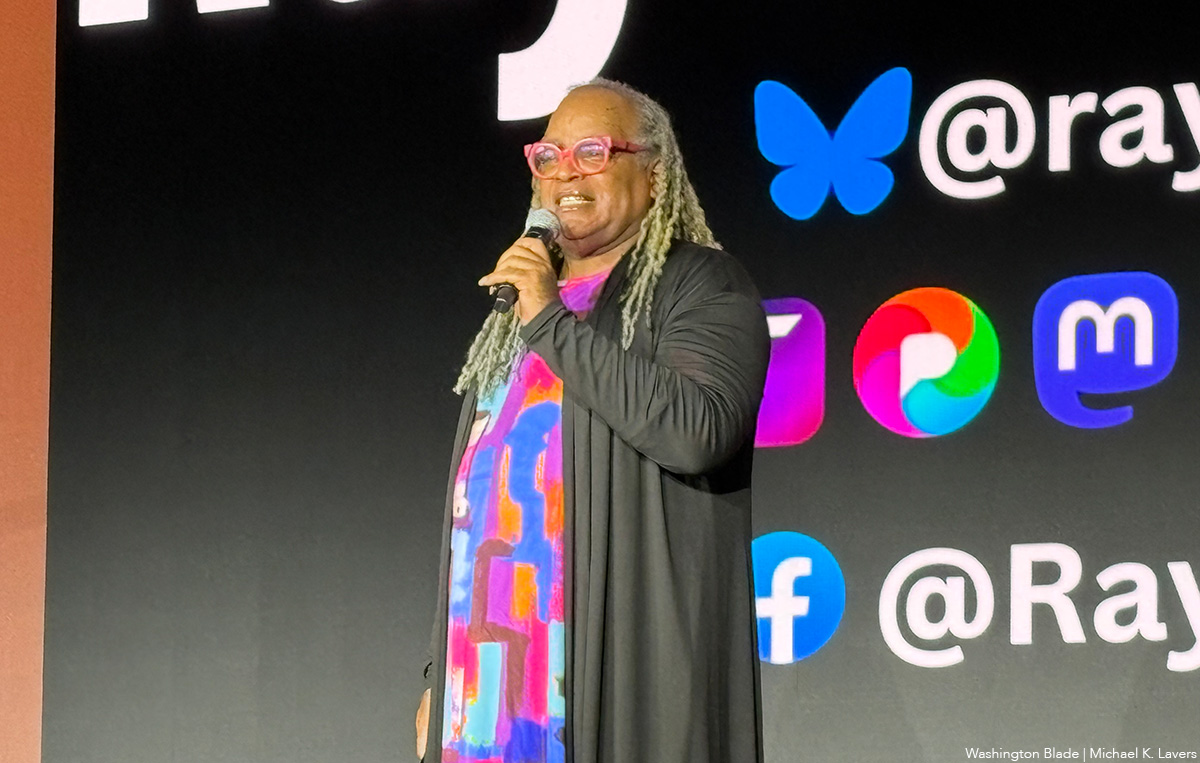Local
Christian conservatives ‘in driver’s seat’ in Va.
Dems consider lawsuit to force power-sharing as activists fear onslaught of anti-gay bills


Virginia Lt. Gov. Bill Bolling would cast the deciding vote in any tie on bills coming up for a vote, effectively giving Republicans a razor-thin majority in the Senate. (Courtesy photo)
LGBT activists said they were hopeful that the threat of a lawsuit by Democratic members of the Virginia Senate this week would persuade Republicans to share control of the chamber and decrease the chance that it will enact anti-LGBT bills following the GOP gains in last week’s election.
No one disputes the fact that Republicans have gained a one-vote legislative majority in the Virginia Senate after Republican candidates defeated two incumbent Democrats in the 40-member Senate, resulting in a 20-20 split between the two parties.
Under the Virginia Constitution, the lieutenant governor — in this case Republican Bill Bolling — has authority to cast the deciding vote in any tie on bills coming up for a vote, effectively giving Republicans a razor-thin majority in the Senate.
ALSO IN THE BLADE: HOW DID LGBT CANDIDATES FARE IN VIRGINIA ON ELECTION NIGHT?
But Democrats argue that the constitution doesn’t give Bolling authority to vote on non-legislative matters, such as who should be named as chairs of the body’s powerful committees and which party should control the committees. Both sides say the matter could wind up in court if a compromise isn’t reached before the new legislative session begins in the second week of January.
Republicans increased their existing majority in the state’s House of Delegates in the Nov. 8 election. With Republican Robert McDonnell as governor, if Republicans win the dispute over who fully controls the Senate, the conservative-leaning GOP would be in control of all branches of the Virginia government for the first time since the Civil War.
“Virginia is never a place to look for gay-friendly legislation,” said Stephen Farnsworth, professor of political communications at George Mason University and a specialist in Virginia politics. “But what you’re looking at now is a Christian conservative element of the Republican Party that is very much in the driver’s seat going forward.”
Gay Democratic leaders and LGBT activists acknowledge that even if Democrats prevail on the issue of power sharing regarding Senate committees, the Republican majority for votes on legislation means that that the Senate is now far less likely to block anti-gay bills as it did when it was under Democratic control.
“We can certainly expect that there’s going to be a cascade of really unsavory bills flooding over to the Senate from the House as there have been in recent years pertaining to issues of immigration, women’s rights and obviously gay rights, too,” said Nick Benton, editor and publisher of the Falls Church News-Press and board member of LGBT Democrats of Virginia.
“And how many of those bills can be made to die in the Senate at this point becomes a much dicier situation,” Benton said. “There’s no guarantee at all that any of that stuff is going to be beaten back.”
Nearly all news media outlets, including the Washington Post, have reported since last week’s election that Lt. Gov. Bolling’s authority to break a tie vote in the Senate would extend to votes on committee and internal Senate organizational issues as well as votes on bills.
But some Democrats this week said they dispute Republicans’ contention that the lieutenant governor has the power to vote on non-legislative issues.
“Fundamentally, the question is whether under the Virginia Constitution he has the authority to vote on Senate organizational issues as contrasted to legislative matters, substantive matters,” said Claire Gastanaga, legislative counsel and chief lobbyist for Equality Virginia, a statewide LGBT advocacy group.
“I’m not ready to predict exactly what’s going to happen with respect to the issues that we care about,” she said. “We’ll be pursuing Equality Virginia’s agenda as we always have, and once the organizational decisions are made then we’ll know who we needed to be talking to.”
Since committees and their chairs decide which bills reach the Senate floor for a vote, a determination of which party controls the committees will play a key role in deciding which bills are passed, including a bill introduced in past years calling for banning adoptions by gay and lesbian parents.
Democrats note that when there was a similar 20-20 split between the two parties in the Senate in 1996 and 1997, party leaders worked out a power sharing agreement that enabled Republicans and Democrats to chair different committees.

Newly elected Va. State Sen. Adam Ebbin said he plans to introduce a bill to bar employment discrimination against state employees based on sexual orientation and gender identity. (Photo courtesy Adam Ebbin)
House of Delegates member Adam Ebbin (D-Alexandria), the Virginia Legislature’s only openly gay member, won his race last week for a seat in the Virginia Senate, becoming the first out gay in that body.
ALSO IN THE BLADE: EBBIN’S MARCH TOWARD MAKING HISTORY
Ebbin said this week that he, too, is uncertain about the outcome of the dispute over whether Republicans will gain full control over the Senate committees or whether a power-sharing agreement will be reached. In either case, Ebbin said he plans to introduce a bill calling for banning employment discrimination against state employees based on sexual orientation and gender identity similar to the bill he introduced earlier this year.
The bill passed in the then Democratic-controlled Senate but died in committee in the GOP-controlled House.
Ebbin said he and LGBT allies in the Senate and House will do all they can to block anti-gay bills in the 2012 legislative session. But similar to Benton, Ebbin said the ability to block hostile bills will be more difficult under a GOP-controlled Senate.
“In the past, we’ve been able to count on the Senate to thwart anti-gay legislation passed by the House,” he said. “We can’t count on the Senate to do that in the next legislative session. I’m not saying that things won’t get killed in the Senate. It’s just that we can’t absolutely count on it.”
Ebbin said that in addition to a possible bill to ban gay adoptions, conservative GOP lawmakers could bring up other hostile bills that either surfaced or had been proposed in past years but died in committee. Among them were calls for banning Gay-Straight Alliance clubs in the state’s public schools and a call for banning colleges in the state from adopting non-discrimination polices related to sexual orientation and gender identity.
Ebbin said that although it would be unlikely, anti-gay groups might also attempt to persuade the legislature to repeal the only pro-gay bills it has ever passed – separate measures in 2005 and 2010 that removed an arcane state law that prohibited private insurance companies from selling health and life insurance policies to same-sex couples.
Farnsworth, the George Mason University professor, noted that virtually all Republican candidates in Virginia this year stressed economic and jobs-related issues along with their disagreements with the Obama administration over the economy. He said few if any of the GOP candidates raised social issues, such as gay rights, during their campaigns.
“It will be interesting to see just how the Republican unified government system operates in Virginia,” he said. “The lessons that Republicans have learned from the experiences in Wisconsin and Ohio and other places is that overreaching, offering up polarizing messages can be counterproductive.”
He added, “Careful Republicans with their eyes on the future may be hesitant to go too far in the conservative direction and risk a backlash.”
Are moderate Republicans the answer?
LGBT activists were hopeful that more moderate Republicans would join Sen. Tommy Norment (R-Williamsburg), the current minority leader who’s in line to become Republican majority leader. Norment was the only Republican in the Senate to vote for the state employment non-discrimination bill earlier this year when the Democratic-controlled Senate passed the measure.
Tiffany Joslyn, president of LGBT Democrats of Virginia, said she doubts that very many Republican lawmakers in the state would join Norment in backing LGBT supportive bills.
“I have no doubt they will do the same thing that they always do,” she said. “They preach moderation, they preach jobs, and then they get into office and they govern from the far right and to their far-right base.”
Joslyn called on Log Cabin Republicans of Virginia to join her group and Equality Virginia in urging more GOP lawmakers to support legislation seeking to bar LGBT discrimination in the workplace and in other areas.
Log Cabin Republicans of Virginia President David Lampo couldn’t be immediately reached this week. Christian Berle, deputy executive director of the national Log Cabin Republicans organization, said both the national and Virginia group would continue their ongoing efforts to encourage Republican lawmakers to support LGBT equality in all levels of government.
Berle also disputed predictions by gay Democrats that a GOP-controlled Virginia Legislature would result in the passage of anti-gay bills.
“They said the same thing would happen with Gov. McDonnell, that all kinds of bad things would happen,” said Berle. “It didn’t happen.”
He criticized Equality Virginia for taking the position that “only Democrats” could be counted on to support LGBT equality in the state and expressed concern that more LGBT advocates didn’t support gay Republican candidate Patrick Forrest’s race for a state Senate seat in the Northern Virginia city of Reston in this year’s election.
ALSO IN THE BLADE: IS VIRGINIA GAY REPUBLICAN SENATE CANDIDATE VICTIM OF GAY BAITING?
Gay Democrats said most LGBT activists didn’t support Forrest because he ran against incumbent Sen. Janet Howell, one of the LGBT community’s strongest allies in the Virginia Legislature.
Virginia
McPike wins special election for Va. House of Delegates
Gay Alexandria City Council member becomes 8th LGBTQ member of legislature

Gay Alexandria City Council member Kirk McPike emerged as the decisive winner in a Feb. 10 special election for a seat in the Virginia House of Delegates representing Alexandria.
McPike, a Democrat, received 81.5 percent of the vote in his race against Republican Mason Butler, according to the local publication ALX Now.
He first won election to the Alexandria Council in 2021. He will be filling the House of Delegates seat being vacated by Del. Elizabeth Bennett-Parker (D-Alexandria), who won in another Feb. 10 special election for the Virginia State Senate seat being vacated by gay Sen. Adam Ebbin (D-Alexandria).
Ebbin is resigning from his Senate next week to take a position with Virginia Gov. Abigail Spanberger’s administration.
Upon taking his 5th District seat in the House of Delegate, McPike will become the eighth out LGBTQ member of the Virginia General Assembly. Among those he will be joining is Sen. Danica Roem (D-Manassas), who became the Virginia Legislature’s first transgender member when she won election to the House of Delegates in 2017 before being elected to the Senate in 2023.
“I look forward to continuing to work to address our housing crisis, the challenge of climate change, and the damaging impacts of the Trump administration on the immigrant families, LGBTQ+ Virginians, and federal employees who call Alexandria home,” McPike said in a statement after winning the Democratic nomination for the seat in a special primary held on Jan. 20.
McPike, a longtime LGBTQ rights advocate, has served for the past 13 years as chief of staff for gay U.S. Rep. Mark Takano (D-Calif.) and has remained in that position during his tenure on the Alexandria Council. He said he will resign from that position before taking office in the House of Delegates.
Local
Local LGBTQ groups, activists to commemorate Black History Month
Rayceen Pendarvis to moderate Dupont Underground panel on Sunday

LGBTQ groups in D.C. and elsewhere plan to use Black History Month as an opportunity to commemorate and celebrate Black lives and experiences.
Team Rayceen Productions has no specific events planned, but co-founder Rayceen Pendarvis will attend many functions around D.C. this month.
Pendarvis, a longtime voice in the LGBTQ community in D.C. moderated a panel at Dupont Underground on Feb. 8. The event, “Every (Body) Wants to Be a Showgirl,” will feature art from Black burlesque artists from around the country. Pendarvis on Feb. 23 will attend the showing of multimedia play at the Lincoln Theatre that commemorates the life of James Baldwin.
Equality Virginia plans to prioritize Black voices through a weekly online series, and community-based story telling. The online digital series will center Black LGBTQ voices, specifically trailblazers and activists, and contemporary Black queer and transgender people.
Narissa Rahaman, Equality Virginia’s executive director, stressed the importance of the Black queer community to the overall Pride movement, and said “Equality Virginia is proud to center those voices in our work this month and beyond.”
The Capital Pride Alliance, which hosts Pride events in D.C., has an alliance with the Center for Black Equity, which brings Black Pride to D.C. over Memorial Day weekend. The National LGBTQ Task Force has no specific Black History Month events planned, but plans to participate in online collaborations.
Cathy Renna, the Task Force’s director of communications, told the Washington Blade the organization remains committed to uplifting Black voices. “Our priority is keeping this at the forefront everyday,” she said.
The D.C. LGBTQ+ Community Center is also hosting a series of Black History Month events.
The D.C. Public Library earlier this year launched “Freedom and Resistance,” an exhibition that celebrates Black History Month and Martin Luther King Jr. It will remain on display until the middle of March at the Martin Luther King Jr. Memorial Library at 901 G St., N.W.
District of Columbia
U.S. Attorney’s Office drops hate crime charge in anti-gay assault
Case remains under investigation and ‘further charges’ could come

D.C. police announced on Feb. 9 that they had arrested two days earlier on Feb. 7 a Germantown, Md., man on a charge of simple assault with a hate crime designation after the man allegedly assaulted a gay man at 14th and Q Streets, N.W., while using “homophobic slurs.”
But D.C. Superior Court records show that prosecutors with the Office of the U.S. Attorney for D.C., which prosecutes D.C. violent crime cases, charged the arrested man only with simple assault without a hate crime designation.
In response to a request by the Washington Blade for the reason why the hate crime designation was dropped, a spokesperson for the U.S. Attorney’s office provided this response: “We continue to investigate this matter and make no mistake: should the evidence call for further charges, we will not hesitate to charge them.”
In a statement announcing the arrest in this case, D.C. police stated, “On Saturday, February 7, 2026, at approximately 7:45 p.m. the victim and suspect were in the 1500 block of 14th Street, Northwest. The suspect requested a ‘high five’ from the victim. The victim declined and continued walking,” the statement says.
“The suspect assaulted the victim and used homophobic slurs,” the police statement continues. “The suspect was apprehended by responding officers.”
It adds that 26-year-old Dean Edmundson of Germantown, Md. “was arrested and charged with Simple Assault (Hate/Bias).” The statement also adds, “A designation as a hate crime by MPD does not mean that prosecutors will prosecute it as a hate crime.”
Under D.C.’s Bias Related Crime Act of 1989, penalties for crimes motivated by prejudice against individuals based on race, religion, sexual orientation, gender identity, disability, and homelessness can be enhanced by a court upon conviction by one and a half times greater than the penalty of the underlying crime.
Prosecutors in the past both in D.C. and other states have said they sometimes decide not to include a hate crime designation in assault cases if they don’t think the evidence is sufficient to obtain a conviction by a jury. In some instances, prosecutors have said they were concerned that a skeptical jury might decide to find a defendant not guilty of the underlying assault charge if they did not believe a motive of hate was involved.
A more detailed arrest affidavit filed by D.C. police in Superior Court appears to support the charge of a hate crime designation.
“The victim stated that they refused to High-Five Defendant Edmondson, which, upon that happening, Defendant Edmondson started walking behind both the victim and witness, calling the victim, “bald, ugly, and gay,” the arrest affidavit states.
“The victim stated that upon being called that, Defendant Edmundson pushed the victim with both hands, shoving them, causing the victim to feel the force of the push,” the affidavit continues. “The victim stated that they felt offended and that they were also gay,” it says.
-

 Virginia3 days ago
Virginia3 days agoMcPike wins special election for Va. House of Delegates
-

 New York5 days ago
New York5 days agoPride flag removed from Stonewall Monument as Trump targets LGBTQ landmarks
-

 Florida5 days ago
Florida5 days agoDisney’s Gay Days ‘has not been canceled’ despite political challenges
-

 Philippines5 days ago
Philippines5 days agoPhilippines Supreme Court rules same-sex couples can co-own property

















